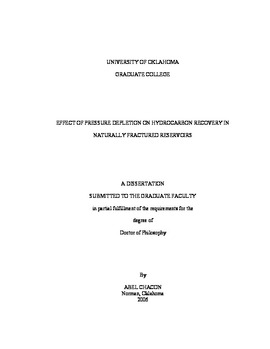| dc.contributor.advisor | Tiab, Djebbar, | en_US |
| dc.contributor.author | Chacon, Abel. | en_US |
| dc.date.accessioned | 2013-08-16T12:20:25Z | |
| dc.date.available | 2013-08-16T12:20:25Z | |
| dc.date.issued | 2006 | en_US |
| dc.identifier.uri | https://hdl.handle.net/11244/1113 | |
| dc.description.abstract | The link between well test analysis, the material balance equation, and the elastic properties of the rock resides in the fluid storage capacity. Thus, in this study, the influence of stress on the mechanical behavior of the fractured rock, and its effect on the rock properties such as permeability, porosity and compressibility is analyzed using the bulk modulus and normal compliance of the fracture which are elastic properties. The influence of stress on the mechanical behavior of the fractured rock and its effect on several rock properties can be obtained from core analysis or multi-component seismic interpretation, which is linked to well test analysis and the material balance equation through the storage capacity ratio equation. Furthermore, an example using real data from a pressure buildup test explaining the proposed well test analysis technique is included. In addition, a method to compute the fracture and matrix compressibility from the integration between well test analysis and the mechanical behavior of the rock is also presented. | en_US |
| dc.description.abstract | Modeling and current methods to identify and characterize NFRs from seismic and well test data are briefly discussed. In NFRs fluids are stored inside the matrix pore space and inside the fractures of the rock. The parameter indicating the volumetric fraction of fluids deposited inside the fractures is the storage capacity ratio, which is the function of the fracture and matrix porosity, and fracture and matrix compressibility. Since it is very difficult to obtain these values, it is generally assumed that the matrix and the fracture compressibilities are equal, which induces a big uncertainty in the estimation of the storage capacity ratio as well as an inaccurate estimation of the volume of fluids inside the fractured rock. | en_US |
| dc.description.abstract | This study analyzes the effects of stress on several properties of naturally fractured reservoirs (NFRs), e.g. fracture and matrix compressibility, fracture and matrix porosity, permeability in NFRs, and its implications on hydrocarbon recovery. | en_US |
| dc.description.abstract | Finally, the effects on hydrocarbon recovery due to differences in fracture and matrix compressibilities, and the effect of changes in the in-situ effective stress of the rock caused for depletion are incorporated into the material balance equation. | en_US |
| dc.format.extent | xv, 168 leaves : | en_US |
| dc.subject | Geophysics. | en_US |
| dc.subject | Rocks Fracture. | en_US |
| dc.subject | Energy. | en_US |
| dc.subject | Geology. | en_US |
| dc.subject | Oil reservoir engineering. | en_US |
| dc.subject | Porosity. | en_US |
| dc.subject | Engineering, Petroleum. | en_US |
| dc.title | Effect of pressure depletion on hydrocarbon recovery in naturally fractured reservoirs. | en_US |
| dc.type | Thesis | en_US |
| dc.thesis.degree | Ph.D. | en_US |
| dc.thesis.degreeDiscipline | Mewbourne School of Petroleum and Geological Engineering | en_US |
| dc.note | Adviser: Djebbar Tiab. | en_US |
| dc.note | Source: Dissertation Abstracts International, Volume: 67-10, Section: B, page: 6031. | en_US |
| ou.identifier | (UMI)AAI3238432 | en_US |
| ou.group | Mewbourne College of Earth and Energy::Mewbourne School of Petroleum and Geological Engineering | |
